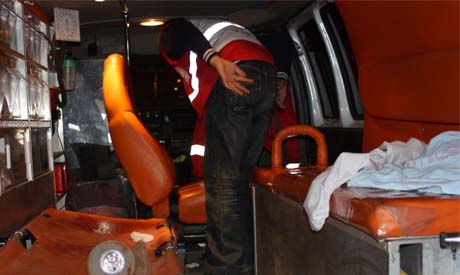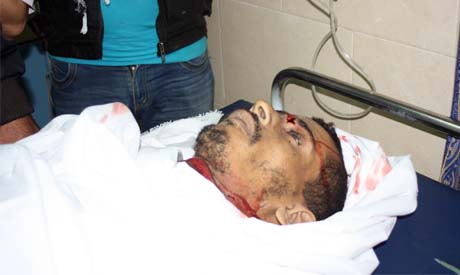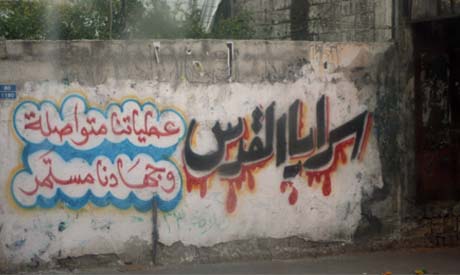Flooding into the main courtyard of the Dar Al-Shifaa hospital in Gaza, over 550 Egyptians on a solidarity convoy chanted, "Gaza, Gaza, Egyptians are with you."
In the press conference held in the main courtyard, the Gazan Minister of Health Hani Abdeen, together with the organisers of the convoy, spoke to the crowd.
Despite regular shelling being heard as the convoy entered Gaza, the Palestinians said this was the first time since the start of the latest offensive that the shelling had halted for at least an hour.

Minutes after the convoy reached Gaza Al-Shifaa Hopsital, Sunday (Photo: Nada El-Kouny)
The grim reality of the situation quickly sunk in.
A woman’s screams could be heard from inside the hospital. Shortly afterwards she was ushered out by her family members: her relative had just passed away.
The ambulances started to come thick and fast, dropping off bodies at the main doors.
Paramedics routinely cleaned off stretchers, pushed them back into the vehicles and rushed off to another scene.
Distraught families, concerned onlookers and frenzied journalists stood in the chaotic main emergency room.

Ambulance stretcher being cleaned with bloodied gas mask seen on stretcher, Al-Shifaa hospital, Gaza, Sunday (Photo: Nada El-Kouny)
Bodies were laid out on the emergency room floor. One, a 15-year-old boy who had died from shrapnel wounds sustained when he happened to walk past the latest rocket target, was wrapped in a white sheet with his bloodied face exposed.
Doctors said he was due to be cleaned and sent to the morgue along with dozens of other bodies.

Latest casualty as a result of shrapnel wounds in emergency room, Al-Shifaa hospital, Sunday (Photo: Nada El-Kouny)
Zakaria, 40, a doctor taking a momentary break from the overflow of casualties, stopped to recount the last week in Gaza.
Seemingly calm and distant, he said it had been frantic since the Israeli Pillar of Defense operation started five days before.
There had been twenty deaths that day alone, he continued, ten of which were from the same family.
"Only on the first day was there a significant number of militants coming in injured or dead to the hospital," he said. In the following days, the overwhelming majority had been young children, women, sheikhs and the "common citizens of Gaza."
"We are targeted all the time. As we come to work each day, we are targeted," Zakaria stressed.
Another paramedic, in charge of transporting bodies to the emergency room, explained that the morgue was "filled with young souls, all these babies are now dead, piled on top of each other."
Ramy El-Shayah, executive manager of the Gaza Immediate Voluntary Relief Effort, also reiterated the overwhelming number of civilian casualties.
He explained that a large part of the humanitarian relief and support they provide had been directed to orphaned children.
"Fifty per cent of the population in Gaza are children. Thirty-two per cent of those are orphaned as a result of the ongoing military offensives," he stated.
Comparing Israel's latest onslaught and the 2008/2009 Cast Lead offensive, El-Shayah said there was the same level of brutality, flagrant targeting of children and civilians, and psychological warfare.
It is sad, he continued, that the Palestinian plight only becomes the focus – following months of it being sidelined by the Syrian conflict – when these "operations" are launched.
"Our only weapon at the moment is resilience," he said, waving us off as we crossed back into Egypt early Monday.
To the Gazans, the Egyptian convoy was an important show of solidarity. One resident joked that, "you have to stay here for good, that way [Israel] will stop targeting us."
Abdeen, the health minister, said, "this is the embodiment of the true Egyptians. Gaza is joyful with your presence."
Ragia Omran, an Egyptian activist and one of the organisers of the convoy, spoke to the crowd and sent a powerful message to the Gazan people.
"Thank you Gaza, thank you for finally making the fragmented political public speak in one voice. Thank you for uniting us once again.
"The pro-Palestine protests and movements in Egypt following the Second Intifada were the building blocks for the January 25 Revolution."
Mohamed Waked, a leading member of the National Front for Justice and Democracy and also an organiser of the convoy, had a different perspective to offer.
"We are protecting our own interests as we stand by the Palestinian people," he asserted, adding that supporting the Palestinian resistance is a springboard for all other regional conflicts.
"By standing up for this cause, we are ensuring the failure of the American project for the region."
Speaking to Ahram Online, Waked said the ‘American project’ aims to put Palestine on the backburner. Such efforts, he believes, are clearly evident with the focus put on Iran and Syria.
There are two major differences between Cast Lead in 2008 and the current operation, he added.
Firstly, is the divisions within the Palestinian factions. Secondly, Waked asserted, is the rise of "Islamism" in the region and Hamas’ control of Gaza, thus making it an easy target for criticism and turning the conflict into a question of being with or against Hamas and the Muslim Brotherhood.
This is why it was crucial to shed light on the issue in the midst of regional and local priorities.

Palestinian resistance grafitti, Gaza city, Monday (Photo: Nada El-Kouny)
"I am taking part in this convoy because I want to show that Egypt is still interested in the Palestinian cause despite going through its own problems," stated Abdel-Meguid Mohamed, 20, a mass communications student and member of the Popular Current movement.
Not all were affiliated with a political group. Khaled Azhary, 22, a student in Islamic studies, joined on his own.
"Even if we are just a mere presence, that is enough for Gazans at such a crucial time. They have to feel that someone stands by them," he said.
The 561 Egyptian convoy participants spent the night in the hospital complex and got a glimpse of the horrors that Gazans suffer on a daily basis.
"It is really a miserable situation, I cannot believe how this crisis has reached such a level where loved ones lose their friends and family and talk about it as just another event," said Mohamed Asy, 23, a young medical student at Qasr Al-Aini hospital.
However, he clarified, this was not apathy towards death, merely desolation.
Short link: